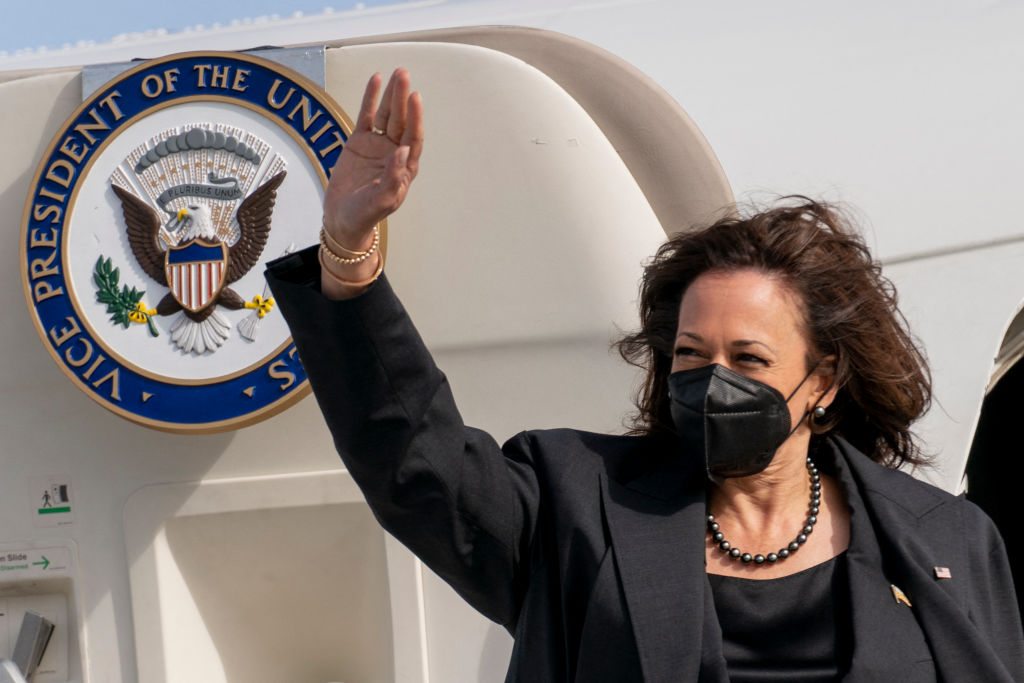Americans could see increased energy costs if Russia invades Ukraine, Harris says


A free daily email with the biggest news stories of the day – and the best features from TheWeek.com
You are now subscribed
Your newsletter sign-up was successful
Vice President Kamala Harris said Sunday that Americans could see their energy costs rise if Russia invades Ukraine, Bloomberg reported.
"It requires sometimes for us to put ourselves out there in a way that, maybe, we will incur some cost. And in this situation, that may be related to energy costs, for example," Harris told reporters at the Munich Security Conference before boarding her flight back to Washington, D.C.
She added that the Biden administration is "taking very specific … steps to mitigate what that cost might be, if it happens."
The Week
Escape your echo chamber. Get the facts behind the news, plus analysis from multiple perspectives.

Sign up for The Week's Free Newsletters
From our morning news briefing to a weekly Good News Newsletter, get the best of The Week delivered directly to your inbox.
From our morning news briefing to a weekly Good News Newsletter, get the best of The Week delivered directly to your inbox.
Americans are already chafing under high energy prices. A Bureau of Labor Statistic report released last month showed that the prices of gasoline and fuel oil increased by 40 and 46.5 percent, respectively, between Dec. 2020 and Dec. 2021. According to Bloomberg, Russia exports more oil to the U.S. than any other nation except Canada.
Europe will also feel the pressure if Russia turns off the tap, and the U.S. could end up paying the price to alleviate that pressure. Last month, The New York Times reported that the Biden administration was working with "gas and crude oil suppliers from the Middle East, North Africa, and Asia" to ensure NATO would not be crippled if Russia shut off natural gas shipments.
The vice president also shut down any speculation that Russia might step back from the brink: "Putin has made his decision. Period."
Harris met with Ukrainian President Volodymyr Zelensky in Munich on Saturday. Zelensky told Harris through an interpreter that he is grateful for American support and that "the only thing we want is to have peace."
A free daily email with the biggest news stories of the day – and the best features from TheWeek.com
In a speech to the conference on Saturday, Harris warned that the U.S. and NATO would respond to a Russian invasion with "far-reaching financial sanctions and export controls," though she clarified Sunday that the U.S. will not impose sanctions preemptively.
Grayson Quay was the weekend editor at TheWeek.com. His writing has also been published in National Review, the Pittsburgh Post-Gazette, Modern Age, The American Conservative, The Spectator World, and other outlets. Grayson earned his M.A. from Georgetown University in 2019.
-
 The Olympic timekeepers keeping the Games on track
The Olympic timekeepers keeping the Games on trackUnder the Radar Swiss watchmaking giant Omega has been at the finish line of every Olympic Games for nearly 100 years
-
 Will increasing tensions with Iran boil over into war?
Will increasing tensions with Iran boil over into war?Today’s Big Question President Donald Trump has recently been threatening the country
-
 Corruption: The spy sheikh and the president
Corruption: The spy sheikh and the presidentFeature Trump is at the center of another scandal
-
 Judge orders Washington slavery exhibit restored
Judge orders Washington slavery exhibit restoredSpeed Read The Trump administration took down displays about slavery at the President’s House Site in Philadelphia
-
 Hyatt chair joins growing list of Epstein files losers
Hyatt chair joins growing list of Epstein files losersSpeed Read Thomas Pritzker stepped down as executive chair of the Hyatt Hotels Corporation over his ties with Jeffrey Epstein and Ghislaine Maxwell
-
 Judge blocks Hegseth from punishing Kelly over video
Judge blocks Hegseth from punishing Kelly over videoSpeed Read Defense Secretary Pete Hegseth pushed for the senator to be demoted over a video in which he reminds military officials they should refuse illegal orders
-
 Trump’s EPA kills legal basis for federal climate policy
Trump’s EPA kills legal basis for federal climate policySpeed Read The government’s authority to regulate several planet-warming pollutants has been repealed
-
 House votes to end Trump’s Canada tariffs
House votes to end Trump’s Canada tariffsSpeed Read Six Republicans joined with Democrats to repeal the president’s tariffs
-
 Bondi, Democrats clash over Epstein in hearing
Bondi, Democrats clash over Epstein in hearingSpeed Read Attorney General Pam Bondi ignored survivors of convicted sex offender Jeffrey Epstein and demanded that Democrats apologize to Trump
-
 El Paso airspace closure tied to FAA-Pentagon standoff
El Paso airspace closure tied to FAA-Pentagon standoffSpeed Read The closure in the Texas border city stemmed from disagreements between the Federal Aviation Administration and Pentagon officials over drone-related tests
-
 ‘The mark’s significance is psychological, if that’
‘The mark’s significance is psychological, if that’Instant Opinion Opinion, comment and editorials of the day
